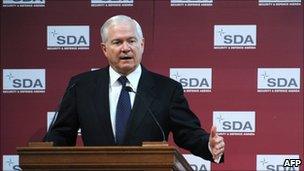Europe's tight fist at Nato irks America
- Published
- comments

Robert Gates spoke at the Security and Defence agenda think tank
It was to an audience in Brussels that the US Defense Secretary, Robert Gates, delivered his final major speech before he stands down. He told us it would be blunt and it was: Europe had to spend more on defence.
He said the Nato operation in Libya had revealed serious shortcomings. Just 11 weeks into the operation - involving the mightiest military alliance in history - the allies revealed they were beginning to run short of munitions. Supplies had to be brought in from the US.
Robert Gates said that since the fall of the Berlin Wall two decades ago America's share of Nato's spending had risen to 75%. He clearly does not think that is sustainable.
Only four European countries are spending 2% of GDP on defence and they are France, the UK, Greece and Albania. The Americans have lobbied strongly against UK defence cuts. Even after 9/11, European defence spending declined by nearly 15% over the following decade.
The defence secretary delivered a message to Europe that there was a new reality in Washington. There, too, there is pressure on the defence budget.
"The blunt reality," he said, "is that there will be dwindling appetite and patience in the US Congress - and in the American body politic writ large - to expend increasingly precious funds on behalf of nations that are apparently unwilling to devote the necessary resources... in their own defence."
New narrative
He spoke about generational change. He said he was 20 years older than the current American president. He had grown up with .
But he warned that future US political leaders - with different formative experiences - might "not consider the return on America's investment in Nato worth the cost".
It was the starkest warning delivered by a US defence secretary: that America, in the future, may tire of helping out Europe in its own backyard.
In both the US and in Europe, a new generation is coming to power for whom World War II is not the defining narrative.
In the same way that further European integration cannot be built on the basis of the war, so too American politicians will not have the emotional and historical attachment to Europe that their predecessors had.
If you want a strong Atlantic partnership, Robert Gates said, the "drift of the last 25 years can't continue".
But despite such a warning, it is unlikely that Europeans will increase their defence budgets at a time of austerity.